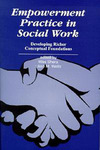We don’t actively support Internet Explorer
It appears that you are using Internet Explorer, which has been discontinued by Microsoft. Support has ended for versions older than 11, and as a result you may face security issues and other problems when using it.
We recommend upgrading to a newer browser such as Firefox, Google Chrome, or Edge for a much better experience across the web.
While this site may work with Explorer, we are not testing and verifying it, so you may run into some trouble or strange looking things.
Emerging Perspectives on Anti-Oppressive Practice
Edited by Wes Shera
Overview
This book consists of 27 chapters developed from papers originally delivered at a recent conference at the University of Toronto on anti-oppressive practice in social work. Dr. Shera has gathered expert contributors to discuss, define, and analyse theories of social work practice, pedagogical issues, fieldwork practice, models of education of social work practitioners, and current critical issues. These selected conference papers lay the groundwork for anti-oppressive practice in a way that will generate discussion and inspire researchers and practitioners.
Table of Contents
Wes Shera
SECTION 1: THEORETICAL PERSPECTIVES
Chapter 1: Theorizing Social Exclusion: Determinants, Mechanisms, Dimensions, Forms, and Acts of Resistance
Luann Good Gingrich
Chapter 2: Margins as Centres: A Theory of Social Inclusion in Anti-Oppressive Social Work
Rick Sin and Miu Chun Yan
Chapter 3: Race, Class, and Gender in the Everyday Talk of Social Workers: The Ways We Limit the Possibilities for Radical Practice
Donna Baines
Chapter 4: Structural Social Work as Seen from an Aboriginal Perspective
Cyndy Baskin
Chapter 5: Cultural Diversity in Social Work Practice: Where Are We Now and What Are the Challenges in Addressing Issues of Justice and Oppression?
Connie H. Nelson and Dennis H. McPherson
SECTION 2: FIELDS OF PRACTICE
Chapter 6: Child Welfare: AOP's Nemesis?
Gary C. Dumbrill
Chapter 7: Services for Street Youth: Do They Reproduce, Contribute to, and Perpetuate Oppression?
Charis Romilly
Chapter 8: "Meaningful" Participation and Governance: Lessons from Visible Minority Parents Using Child Care
Evelyn Ferguson
Chapter 9: Inclusion by Design: The Challenge for Social Work in Workplace Accommodation for People with Disabilities
Donald R. Leslie, Kaye Leslie, and Michelle Murphy
Chapter 10: Communities That Foster Diverse Modes of Existence Versus Societies Based on Control: A PHenomenological Approach to Improve the Deinstitutionalization Process
Alain Beaulieu
Chapter 11: Anti-Oppressive Practice with Older Adults: A Feminist Post-structural Perspective
Deborah O'Connor
SECTION 3: CRITICAL ISSUES
Chapter 12: Social Work Identity and Purpose: Real or Imagined?
Ken Barber
Chapter 13: Narrative Therapy: Reifying or Challenging Dominant Discourse
Catrina Brown
Chapter 14: Reconceptualizing Empathy for Anti-Oppressive, Culturally Competent Practice
Janet L. Clark
Chapter 15: Seeking Cultural Competence: What Is It, How Do You Develop It, and How Do You Know When You've Got It?
Charmaine C. Williams
Chapter 16: Listening to the Voices of Service Participants in Child Protective Services, Children's Mental Health, and Psychotherapy
Marshall Fine, Sally Palmer, and Nick Coady
Chapter 17: A Community Approach to Combating Racism
Roopchand Seebaran
Chapter 18: Community Practice in the Internet Age
Steven F. Hick
Chapter 19: The Right to Food: An Essential Element in a Successful War against Terrorism
William H. Simpson Whitaker
SECTION 4: SOCIAL WORK EDUCATION
Chapter 20: Controversies, Tensions, and Contradictions: Anti-Oppression and Social Justice in the Social Work Curriculum
Judy Hughes, Shirley Chau, Pamela James, and Steven Sherman
Chapter 21: Beyond the Role Play: Alternative Teaching Methods in an Anti-Oppression Classroom
Samantha Wehbi
Chapter 22: Understanding Multiple Oppressions and How They Impact the Person Requesting Assistance
Gilles Tremblay
Chapter 23: Principles and Practices of Anti-Oppressive Pedagogy as Represented by Dr. Terry Swice
Carolyn Campbell
Chapter 24: Are We Ready to Take a Stand? Education about Heterosexism - Fostering Anti-Oppressive Practice
Mike Woodford and Leslie Bella
Chapter 25: Critical Issues in Field Instruction: Empowerment Principles and Issues of Power and Control
Jeanne Bertrand Finch, Jean Bacon, Donna Klassen, and Betty-Jean Wrase
Chapter 26: Promoting Anti-Oppressive Social Work Education: The University of Calgary's Access Learning Circle Model
Michael Kim Zapf, William Pelech, Betty Bastien, Ralph Bodoy, Jeannine Carriere, and Gail Zuk
Chapter 27: Managing Institutional Practices to Promote and Strengthen Diversity: One School's Journey
Nancy MacDonald, Wanda Thomas-Bernard, Carolyn Campbell, Jeanne Fay, Judy MacDonald, and Brenda Richard






